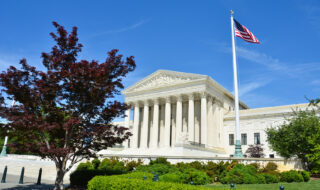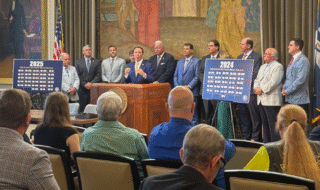January 20, 2022
Supreme Court Rules in NFIB’s Favor, Blocking Enforcement of OSHA’s Vaccine Mandate for Businesses with 100+ Employees
On Thursday, Jan. 13, the U.S. Supreme Court issued a stay of OSHA’s Emergency Temporary Standard (ETS) vaccine mandate, which would require businesses with 100 or more employees to mandate their employees either get vaccinated or wear masks and undergo weekly testing. The mandate would have impacted more than 80 million workers across America.
“Today’s decision is welcome relief for America’s small businesses, who are still trying to get their business back on track since the beginning of the pandemic,” said Karen Harned, Executive Director of NFIB’s Small Business Legal Center, in a statement following the decision. “As small businesses try to recover after almost two years of significant business disruptions, the last thing they need is a mandate that would cause more business challenges. We are pleased the Supreme Court stopped the rule from taking effect while the courts consider whether or not it is legal. We are optimistic that the courts will ultimately agree with us that OSHA does not have the emergency authority to regulate the entire American workforce.”
In November, the NFIB Legal Center filed a legal challenge against the ETS with the U.S. Court of Appeals for the Fifth Circuit. The court placed a stay on the ETS until the legal challenge could be resolved, but in December, the Sixth Circuit Court of Appeals vacated the stay and reinstated the ETS. NFIB, leading a business coalition of over 20 groups, subsequently petitioned the U.S. Supreme Court for a stay of the ETS. The Court accepted the petition and heard oral arguments on Jan. 7.
The mandate was scheduled to begin in January, but the stay means the mandate is not currently in effect. Next, the lawsuit will go back to OSHA and the Sixth Circuit Court of Appeals. “The ball is really in OSHA’s court,” said Karen Harned in a video statement released after the Supreme Court’s decision. “Do they really want to go back to the Sixth Circuit and litigate whether this rule is legal, when the Supreme Court basically told them it is not legal? Or do they want to scrap it altogether?”
NFIB’s argument centered around three main points:
- OSHA needed to use the typical notice-and-comment procedure for the mandate to gather input.
- A nationwide COVID-19 vaccine and testing mandate, monitoring, and database is fundamentally a policy decision that should be left to Congress.
- The mandate will result in unrecoverable compliance costs, lost profits, lost sales, and further exacerbate the labor shortage for small businesses.
NFIB is a member-driven organization advocating on behalf of small and independent businesses nationwide.
Related Articles














